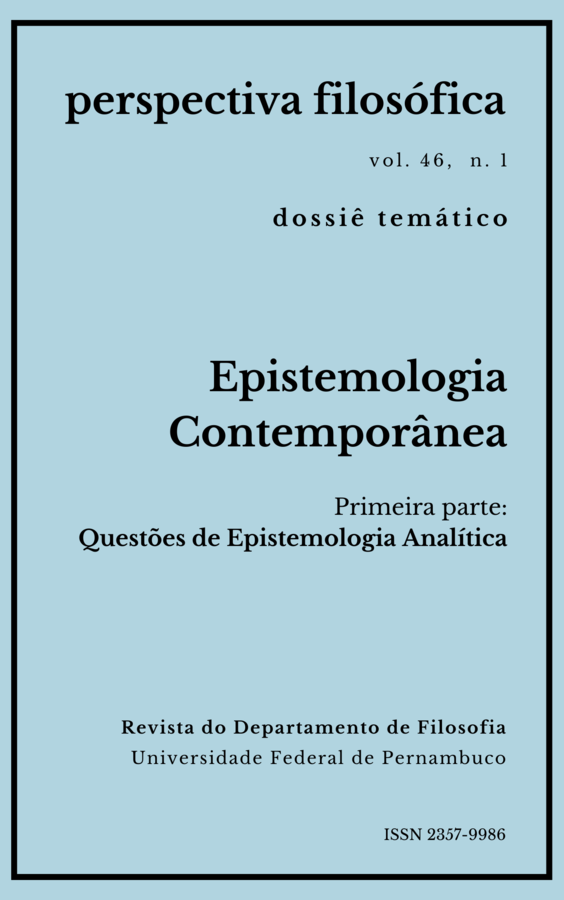Vícios intelectuais, motivação e responsabilidade
DOI:
https://doi.org/10.51359/2357-9986.2019.247947Keywords:
intellectual vices, vice epistemology, motivation, responsibilityAbstract
In this paper, I argue for pluralism about intellectual vices. In the first section, I present obstructionism, that defines intellectual vices as obstacles that prevent or limit the acquisition of knowledge. Next, I describe A. Tanesini's (2019) proposal, who argues that intellectual vices result from a non-instrumental motivation to oppose epistemic goods. I argue that Tanesini's reductive approach is unsuccessful. There are cases of intellectual vices that are not the result of bad motivation. After presenting and discussing obstructionism and the motivational approach, I consider a recent concern, according to which there is a problem of responsibility in vice epistemology.References
AXTELL, Guy. Knowledge, Belief, and Character. Lanham, Rowman andLittlefield, 2000.
BAEHR, Jason. “Epistemic Malevolence”. Metaphilosophy, v. 41, Issue 1-2,2010, p. 189-213.
BATTALY, Heather. (2019). “Vice epistemology has a responsibilityproblem”. Philosophical Issues, v. 29, Issue 1, 2019, p. 24-36.
BATTALY, Heather. “Testimonial injustice, epistemic vice, and vice epistemology”. In I.J. Kidd, G. Polhaus, & J. Medina (Eds.), The Routledge handbook ofepistemic injustice (pp. 223–231). New York: Routledge, 2017.
CASSAM, Quassim. “Vice Epistemology”. The Monist, n. 99, 2016, p. 159-180.
CASSAM, Quassim. “Epistemic Insouciance”. Journal of Philosophical Research. v. 43,2018, p. 1-20.
CASSAM, Quassim. Vices of the Mind: from the Intellectual to the Political. Oxford:Oxford University Press, 2019.
CRERAR, Charlie. “Motivational approaches to intellectual vice”.Australasian Journal of Philosophy, v. 96, 2018, p. 753–766.
FRANKFURT, Harry. On Bullshit. Princeton, NJ: Princeton UniversityPress, 2005.
FRICKER, Miranda. Epistemic Injustice: Power and the Ethics of Knowing.Oxford: Oxford University Press, 2007.
SHER, George. In praise of blame. Oxford: Oxford University Press, 2006.SMITH, Angela S. “Control, responsibility, and moral assessment”. Philosophical Studies, v. 138, 2008, p. 367–392.
SOSA, Ernest. A Virtue Epistemology: Apt Belief and ReflectiveKnowledge, Vol. I. New York: Oxford University Press, 2007.
SOSA, Ernest. Reflective Knowledge: Apt Belief and Reflective Knowledge, Vol.II. New York: Oxford University Press, 2011.
TANESINI, Alessandra. “Epistemic Vice and Motivation”. Metaphilosophy,v. 49, 2018, p. 350-367.
TANESINI, Alessandra. “Blaming the Intellectually Vicious: a Critical Discussion of Cassam’s Account of Blameworthiness and Reprehensibility for EpistemicVice”. Ethical Theory and Moral Practice, 2020.
RICKS, Thomas E. Fiasco: The American Military Adventure in Iraq.Penguin Press, New York, 2006.
ROBERTS, ROBERT C.;WOOD, W. JAY.Intellectual Virtues: An Essay inRegulative Epistemology. Oxford: Oxford University Press, 2007.
WILLIAMSON, T. “Reply to Elizabeth Fricker”. In P. Greenough and D.Pritchard (eds), Williamson on Knowledge. Oxford: Oxford UniversityPress, 2009.
ZAGZEBSKI, Linda.Virtues of the Mind: An Inquiry into the Nature ofVirtue and the Ethical Foundations of Knowledge. Cambridge: CambridgeUniversity Press, 1996.
Downloads
Published
Issue
Section
License
A Revista Perspectiva Filosófica orienta seus procedimentos de gestão de artigos conforme as diretrizes básicas formuladas pelo Conselho Nacional de Desenvolvimento Científico e Tecnológico (CNPq). http://www.cnpq.br/web/guest/diretrizesAutores que publicam nesta revista concordam com os seguintes termos:
Os autores mantém os direitos autorais e concedem à revista o direito de primeira publicação, sendo o trabalho simultaneamente licenciado sob https://creativecommons.org/licenses/by/4.0/deed.pt_BR que permite o compartilhamento do trabalho com reconhecimento da autoria e publicação inicial nesta revista.
Os autores têm autorização para assumir contratos adicionais separadamente, para distribuição não-exclusiva da versão do trabalho publicada nesta revista, com reconhecimento de autoria e publicação inicial nesta revista (Consultar http://opcit.eprints.org/oacitation-biblio.html).

Esta revista está licenciada com uma Licença Creative Commons Atribuição 4.0 Internacional.













